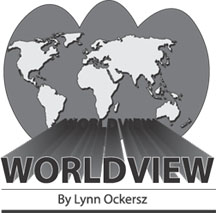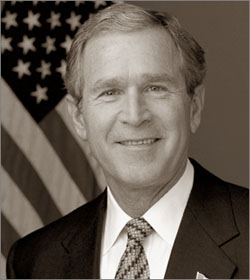|
observer |
|
|
|
|
|
OTHER LINKS |

|

|

|
US President and Congress locked in battle of wills over Iraq
The background to this potentially-bruising collision between the US Executive and the legislature is President George Bush's plan to send some 25,000 more US troops to Iraq, to bolster the US military presence in that country. Besides mounting public disapproval over the proposed move, Democrats in the US House of Representatives and Senate have apparently moved a non-binding resolution condemning the troop build-up plan. Concurrently they launched two Bills requiring Congressional approval for funding additional troops and also calling for "a full withdrawal" of US troops from Iraq. The measures are backed by a lone Republican in Congress. Given the fact that the Democrats dominate Congress, an incipient conflict could be said to be unfolding between the Executive and legislative arms of government, raising the spectre of a constitutional crisis.
Given the quarters from which the opposition is emerging and its proportions, a huge question mark could be placed against the legitimacy of the President's troop-bolstering plan. Meanwhile, the point of view of the Executive arm of government on the issues in question was put forward by Bush spokesman Tony Snow who said that: "At this point, the President has obligations as a Commander in Chief. And he will go ahead and execute them .... To tie one's hand in a time of war is a pretty extreme move." We find emerging in this conflict between the arms of government, a highly engaging constitutional tangle. The Democrat-dominated Congress could be said to represent latest public opinion on issues arising from the Iraq war. The mood of the public too is unmistakable: It wants a military de-escalation in Iraq or a gradual or otherwise troop withdrawal from Iraq. The Executive President, on the other hand, could also claim to be representing the collective opinion of the American people, having been directly elected by them. Therefore, whose policies and actions are right in this confrontation between the different branches of government? This is an issue over which constitutional experts need to ponder but what is of salience to the rest of the democratic world is that such constitutional tangles could be expected in any democratic polity which has opted for the Presidential system of government or what is called a hybrid system which attempts an amalgam between the Presidential and parliamentary systems. Perhaps what such confrontations point to is the need for greater collaboration and unity of purpose between the different arms of government. In the case of the US, given that every two in three Americans oppose the Iraq war, the President is obliged to give Congress a hearing and act in concert with it. On the other hand, Congress is obliged to be sensitive to what is perceived as the national interest of the US-something the President would claim he is acting in accordance with. For instance, in his State of the Union address Bush is reported to have said: "If American forces step back before Baghdad is secure, the Iraq government would be overrun by extremists on all sides. We could expect an epic battle between Shia extremists backed by Iran and Sunni extremists aided by Al Qaeda and supporters of the old regime. A contagion of violence could spill out across the country and in time the entire region could be drawn into the conflict." These concluding sentiments, in particular, are an attempt to win public support for what is considered the American national interest: the need to keep the Gulf region free of political turbulence and armed conflicts, in view of the crucial importance of the region's oil wealth to the American economy. If American public opinion is not seeing eye-to-eye with the political Executive on this crucial issue, one has to conclude that what the public considers is the national interest is strongly at variance with the political Executive's conception of the national interest. Perhaps, we see here the need for a closer dialogue between the American public and the country's political elite on what really matters to the US. A reinvigoration of democratic processes, in short. |
 An
absorbing battle of wills is building-up on Iraqi issues, not on the
blood-spattered streets of Iraq, but between the Executive and
legislative arms of governance in the US. Who will have the decisive
word on these questions: the Executive President or Congress? This is
the prime poser.
An
absorbing battle of wills is building-up on Iraqi issues, not on the
blood-spattered streets of Iraq, but between the Executive and
legislative arms of governance in the US. Who will have the decisive
word on these questions: the Executive President or Congress? This is
the prime poser.  Meanwhile,
public opinion polls reveal that those members of the public opposing
the troop build-up plan lead those for it by a 61-31 percent margin.
Meanwhile,
public opinion polls reveal that those members of the public opposing
the troop build-up plan lead those for it by a 61-31 percent margin. 








